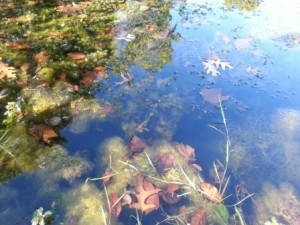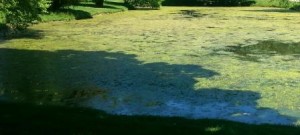Strange title? I sort of thought so as well but hope to make sense of it in a little bit. We already know what ponds are, a pool of water contained in one area where water is supplied to it and released as needed when the water supply become too great. Some parts of the country call ponds tanks and when the pond, pool or tank is big enough they become a lake.
Going back in our articles we learned that once a pond is built, its goal is to revert back to what it once was a field or grassy meadow. How long will it take? No one can say for sure as it really depends on the incoming water, depth of the pond and the construction of the pond.
Some ponds are built to be sort of a dump or at least a single use like containment for nuclear rods, contaminated water from chemical spills even waste from fracking wells even other uses until the water is deemed safe again and in some cases never deemed safe again.
Getting back to our title the “pond dump” and after years of mowing the grass into the pond, dumping grass clippings in the pond and even leaves into the pond. The smell does get rather potent each year. Maybe at first we only smell it when the pond flips over and other times we’ll smell it when walking in and out of the pond. The smell is coming from all the waste in the pond whether it is put into the pond on purpose, washed in from the rain, dying plant growth in the pond, fish waste, leaves and what the water source is that washes into the pond.
In a little more depth, the pond is a good digester and hiding spot for the things we don’t want to see like the grass clippings and leaves. Once below the surface the water covers it up and out of sight out of mind sort of thing.
Now for the pond to get to work. All the debris or what are actually nutrients from these things in the pond the enzymes and bacteria start to get to work. To be up front we’ll talk about two different bacteria’s anaerobic and aerobic bacteria’s. The anaerobic bacteria’s live without or very little oxygen, they do a good job of breaking down the debris but have a couple draw backs in their process. They consume the debris way to slowly allowing the debris to build up each year (which is the reason for the pond reverting back to a grassy meadow).
The other by product is hydrogen sulfide and carbon dioxide, the foul smell you smell walking in and out of the pond
and when the pond flips over. These gasses also create the fish kills we seen over the past few years with the long cold winters. New ponds don’t have this problem right away and could get by for the first year, but as time moves on these gasses start to build from the bottom up. When the pond flips, spring and fall, the gasses are allowed to escape which is what you smell. Over time the gasses continue to build, with more debris, the gasses build up quicker and more in volume. As they build they grow to the surface of the pond pushing the fish to the surface looking for oxygen. When the oxygen is depleted, in severe cases, the fish will actually gasp into the air trying to get oxygen. At this time it is a little too late for them.
If there is ice on the pond then there is nowhere for the toxic gasses to escape, which is the reason we read about winter aeration, keeping a hole in the ice. This way if and when the gasses build they can escape as needed not letting them build in concentration or accumulate under the ice. Winter aeration can also provide oxygen in the area of that diffuser and open water for water fowl.
Not just winter aeration but completely aerating a pond and the regular use of beneficial pond bacteria can help to reverse the buildup of debris, sludge and muck. Move out and expel the toxic gasses while replacing with oxygen.
So the Pond Dump title got a little out of control but hopefully you now understand the what happens in a pond, why some smell worse than others and why fish kills happen.
If you need help aerating your pond or lake, we are here to help. We design for your specific pond needs not just to make a sale. Please us the contact page in the top menu and tell us about your pond.



